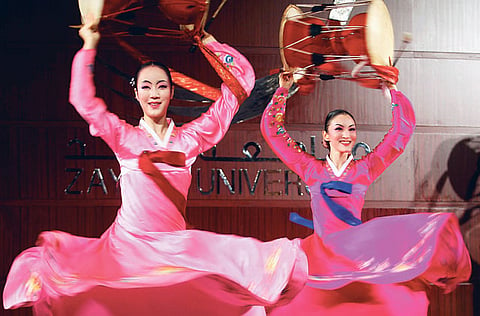Cultural ties help to bind links between UAE and South Korea
Consul-general believes there is support for an annual festival

Dubai: UAE-South Korea ties are on the upswing and a Korean cultural extravaganza last week emphasised that fact.
As part of the cultural exchange programme between the two countries, the Gyeonggi Provincial Dance Company of Korea's cultural performance, titled ‘Movements and Rhythms of Korea' was held in Dubai's Zayed University Convention Centre last week.
The performance marked the 30th anniversary of diplomatic ties between the UAE and Korea.
The band performers, donned in vibrantly coloured hanboks (traditional Korean robes), completed a nine-piece programme. Some of the dances, such as the Fan Dance and Five Drum Dance, focused on using traditional instruments and items as props.
"This performance is a continuation of the last event we held in Dubai in June. Basically, this is also an additional performance, marking the 30th anniversary of diplomatic ties between the two countries," explained Oh Yong-Jin, Korea's Consul General to the UAE.
"I believe that organising such events is the best way to understand different cultures and different countries and people," he said, adding that they also help to narrow the gap of understanding and are a good launching point for promoting cultural awareness and acceptance.
Exchange
The UAE also sends delegations to perform during cultural events in Korea, as part of the cultural exchange programme between the two countries. The most recent one was held on May 5 in Shin Jeju, where a UAE delegation held a cultural performance during the third annual Arab Cultural Festival hosted by the Korean-Arab Society.
Korean dancing's origin is believed to be more than 5,000 years ago, and was a major part of Korean Shamanism. However, the dances were thought to be lost during the Japanese rule 100 years ago. But pioneering Korean dancer Choi Seung-hee created a new form of Korean dancing that preserved the features of Korea's traditional dances.
These days, the dances have adopted two forms, folk dancing and a newly created and adapted contemporary form of dance, that combines both traditional and modern dance.
Oh Yong-Jin said that the cultural performance held in June was very well received.
"The reaction to it exceeded our expectations. We did not expect it. All the seats were taken and some people had to stand to watch the event.
"However, this time, the auditorium had a capacity of 500 seats," he said, adding that, based on the success of the last event, people in the UAE have developed an awareness of Korean culture, which is the goal behind organising such events on a global stage.
"In line with such goals, the Korean Ministry of Foreign Affairs and Trade is discussing, with ministries and organisations, the possibility of introducing a ‘Korea week' in Dubai or Abu Dhabi, sometime next year. We're currently in negotiations with the Sultan Al Owais Cultural Foundation, about launching the event," added the Consul-General.
He pointed out that both events were slightly different but the audience seemed please with both.
Sign up for the Daily Briefing
Get the latest news and updates straight to your inbox



